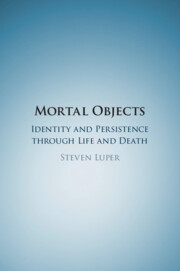Book contents
- Mortal Objects
- Mortal Objects
- Copyright page
- Contents
- Acknowledgments
- Introduction
- Chapter 1 Material Objects
- Chapter 2 Conformism
- Chapter 3 Organisms
- Chapter 4 Incregratism
- Chapter 5 Selves
- Chapter 6 The Cogito
- Chapter 7 Living and Dying
- Chapter 8 Welfare and Nonexistence
- Chapter 9 What We Can Become
- Chapter 10 (Re)making Ourselves
- Chapter 11 The Meaning of Life and Death
- References
- Index
Chapter 6 - The Cogito
Published online by Cambridge University Press: 27 January 2022
- Mortal Objects
- Mortal Objects
- Copyright page
- Contents
- Acknowledgments
- Introduction
- Chapter 1 Material Objects
- Chapter 2 Conformism
- Chapter 3 Organisms
- Chapter 4 Incregratism
- Chapter 5 Selves
- Chapter 6 The Cogito
- Chapter 7 Living and Dying
- Chapter 8 Welfare and Nonexistence
- Chapter 9 What We Can Become
- Chapter 10 (Re)making Ourselves
- Chapter 11 The Meaning of Life and Death
- References
- Index
Summary
Here I discuss an argument, suggested by some things that Descartes said, which appears to refute animal essentialism:
1. Suppose that being an organism is essential to me.
2. Then it is impossible for me to exist yet fail to have the features that make for being an organism.
3. If it is impossible for me to exist yet fail to have these features, and my existence is certain, for me, then it is also certain that I have these features.
4. It is certain for me that I exist.
5. But it is not certain for me that I have the features that make for being an organism.
6. 2–5 are inconsistent, so 2, and the assumption at step 1, are false. Being an organism is not essential to me.
I argue that the third premise is vulnerable to attack on the grounds that it is based on a closure principle (certainty is closed under strict implication) that, arguably, is implausible. I also argue that Premise 4 may be challenged by appealing to an account of certainty inspired by some remarks by Lichtenberg, according to which my existence is not certain for me.
Information
- Type
- Chapter
- Information
- Mortal ObjectsIdentity and Persistence through Life and Death, pp. 95 - 109Publisher: Cambridge University PressPrint publication year: 2022
